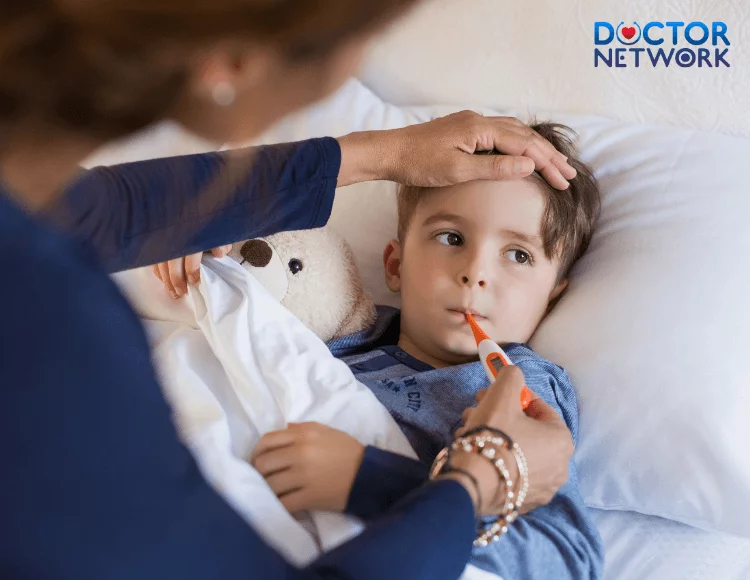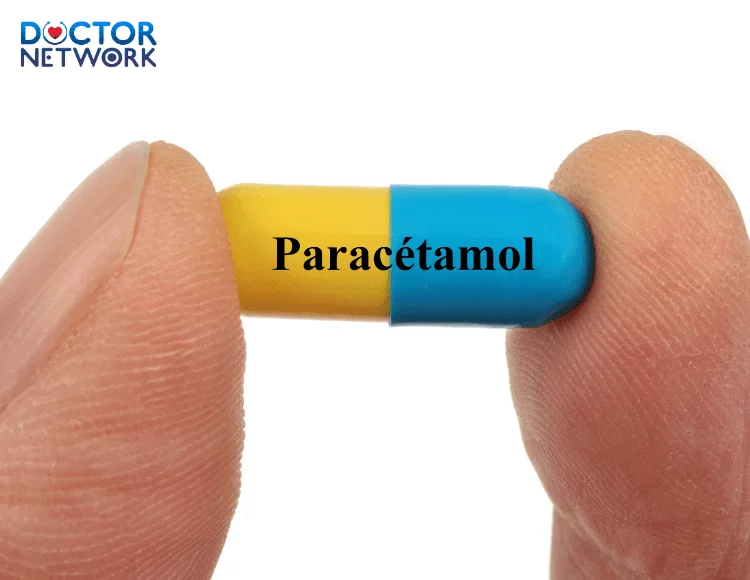High fever in children that won’t subside is not only a concern for parents, but it’s also a leading cause of serious illnesses. Let’s delve into the details of the causes and prevention methods when dealing with “persistent high fever in children“.
Causes and Symptoms
Causes of High Fever
Among the various causes of high fever in children, infections top the list as a significant contributor to this condition. Bacteria and viruses, cunning adversaries, have the capability to raise a child’s body temperature. Additionally, conditions such as hypertension also emerge as undeniable factors, especially in young children with a family medical history.

Infection is one of the leading causes of high fever in children
Symptoms of Persistent High Fever in Children
- Elevated Body Temperature – symptom of persistent high fever in children: One of the most evident symptoms when a child suffers from high fever is an increase in body temperature. Frequently measured using a thermometer, high fever can be the initial sign indicating the invasion of infectious agents or other medical conditions.
- Runny nose, cough, and other symptoms: Alongside elevated body temperature, children experiencing “persistent high fever” often exhibit symptoms such as a runny nose, cough, sometimes accompanied by a sore throat. These manifestations could be signs of a battle against viruses or bacteria.
- Other bodily manifestations of illness: Depending on the specific cause, children may also experience other symptoms like headaches, nausea, or even fatigue and overall weakness. This necessitates careful observation and assessment from caregivers and a professional healthcare team.
Care and Treatment
1. Natural Fever Reduction Methods
When a child experiences high fever, implementing natural methods is an essential part of care:
Using cold or warm water – treatment of persistent high fever in children
- Cold water can be applied through techniques such as cold compresses to specific body areas or by taking a cold bath. This helps rapidly reduce body temperature.
- Warm water, through bathing or using warm packs, can enhance comfort and alleviate tension.
Rest and hydration
- Ensure the child gets enough rest to allow the body to recuperate. Reducing physical activity and creating comfortable conditions can help alleviate stress on the body.
- Maintaining hydration by using a humidifier or placing a damp cloth on the child’s forehead helps reduce temperature and soothe the skin.
Fever-Reducing Medication
When natural methods are insufficient, using fever-reducing medication is a reasonable option, but it should be done correctly:
Appropriate medication and dosage
- Paracetamol and ibuprofen are commonly used to reduce fever in children. However, attention should be paid to the appropriate type of medication and dosage for each child’s age.

Paracetamol and ibuprofen are commonly used to reduce fever in children
- Consulting with a doctor or healthcare professional ensures that the medication is used correctly and safely for the child.
Caution in medication use – treatment of persistent high fever in children
- Adhering to the correct dosage and usage time as per the doctor’s instructions.
- Being vigilant about possible side effects and noting any unusual signs.
Effective care and treatment require keen observation and regular monitoring from caregivers, as well as professional guidance from healthcare teams.
When to See a Doctor
Signs to Watch For
During the care of a child with “persistent high fever,” identifying signs that require attention helps make informed decisions about seeing a doctor:
- Body temperature exceeding safe limits: The clearest sign is when a child’s body temperature surpasses the safe limit. This could be indicative of a severe infection or illness.
- Symptoms persisting after medication use: If symptoms persist or recur after using fever-reducing medication, it could be a sign of a more serious health issue requiring medical intervention.
- Deteriorating overall health: Rapid deterioration in a child’s overall health, including dehydration, fatigue, or even loss of consciousness, warrants careful evaluation.
The importance of timely doctor visits
- Timely doctor visits not only help accurately identify the cause of the fever but also prevent the progression of the illness.
- Doctors can conduct tests and comprehensive health assessments to provide an accurate diagnosis and prescribe appropriate treatment.
Ultimately, the most important aspect is ensuring that a child’s health is assessed and managed by healthcare experts, supporting caregivers in the process of caring for children with persistent high fever.
Prevention and Overall Child Health Care
Nutrition
Nutrition is a crucial factor in preventing “persistent high fever.” A balanced diet, providing adequate nutrition and hydration, enhances a child’s immune system, reduces the risk of illness, and supports the treatment process when a child has a fever.
Immunization
Ensuring complete and timely immunization is an effective measure in preventing the spread of infectious diseases. Vaccines such as Hib vaccine, Hepatitis B vaccine, MMR vaccine, help protect children from various illnesses, especially those that can cause high fever.
Psychological health and physical activity
- A child’s psychological well-being plays a vital role in maintaining overall health. Providing mental support and creating a safe environment can reduce stress and enhance resilience against illnesses.
- Physical activity is an essential part of a healthy lifestyle. It not only strengthens the immune system but also reduces the risk of many illnesses. Increasing daily physical activity is also an effective measure in maintaining weight and overall health for children.
Expert Healthcare Advice
- Pediatrician: Pediatricians are specialists with in-depth knowledge of children’s health. Regular visits to a pediatrician help monitor a child’s development, provide vaccination schedules, and advise on appropriate nutrition.
- Pediatric healthcare specialist: Pediatric healthcare specialists play a crucial role in evaluating and treating children with health issues, including persistent high fever. Their professionalism and experience are decisive in the care process.

Pediatric healthcare specialists play a crucial role in evaluating and treating children with health issues, including persistent high fever
- Family doctor’s advice: Family doctors act as a link between the child and the healthcare system. They can provide detailed information about overall health, while also advising and supporting caregivers in maintaining and improving children’s health.
Some relevant studies about “persistent high fever in children”
Here are some studies about “persistent high fever in children“:
1. According to the World Health Organization (WHO), influenza is a respiratory illness caused by the influenza virus. High fever is one of the most common symptoms of influenza, especially in children.
2. Pneumonia is a lung infection caused by bacteria, viruses, or fungi. High fever is a common symptom of pneumonia, particularly in children.
3. Otitis media is a middle ear infection caused by bacteria or viruses. High fever is a common symptom of otitis media, especially in children.
4. Acute leukemia is cancer of the white blood cells. High fever is a common symptom of acute leukemia.
In conclusion, the article has outlined the causes and prevention methods for dealing with “persistent high fever in children“. The condition of “persistent high fever” is not only a common medical issue but also poses significant challenges in the process of healthcare for children. Identifying causes, symptoms, and applying effective care measures are crucial factors in protecting children’s health.
References:
https://www.stanfordchildrens.org/en/topic/default?id=fever-in-children-90-P02512
Kiểm Duyệt Nội Dung
More than 10 years of marketing communications experience in the medical and health field.
Successfully deployed marketing communication activities, content development and social networking channels for hospital partners, clinics, doctors and medical professionals across the country.
More than 6 years of experience in organizing and producing leading prestigious medical programs in Vietnam, in collaboration with Ho Chi Minh City Television (HTV). Typical programs include Nhật Ký Blouse Trắng, Bác Sĩ Nói Gì, Alo Bác Sĩ Nghe, Nhật Ký Hạnh Phúc, Vui Khỏe Cùng Con, Bác Sỹ Mẹ, v.v.
Comprehensive cooperation with hundreds of hospitals and clinics, thousands of doctors and medical experts to join hands in building a medical content and service platform on the Doctor Network application.

























